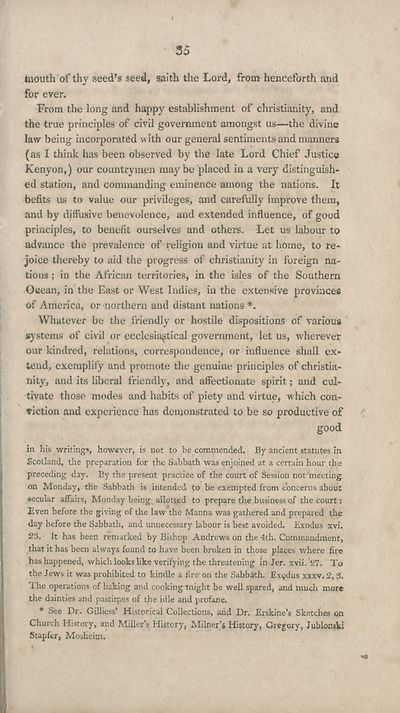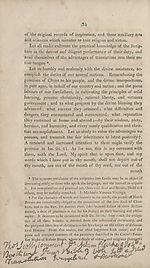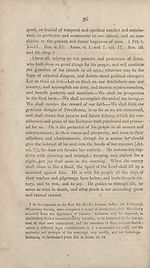Books and other items printed in Gaelic from 1801 to 1840 > Sacred lessons and exercises, English and Gaelic
(51) Page 35
Download files
Complete book:
Individual page:
Thumbnail gallery: Grid view | List view

35
tnouth of thy seed’s seed, saith the Lord, from henceforth and
for ever.
From the long and happy establishment of Christianity, and
the true principles of civil government amongst us—the divine
law being incorporated «ith our general sentiments and manners
(as I think has been observed by the late Lord Chief Justice
Kenyon,) our countrymen may be placed in a very distinguish¬
ed station, and commanding eminence among the nations. It
befits us to value our privileges, and carefully improve them,
and by diffusive benevolence, and extended influence, of good
principles, to benefit ourselves and others. Let us labour to
advance the prevalence of religion and virtue at home, to re¬
joice thereby to aid the progress of Christianity in foreign na¬
tions ; in the African territories, in the isles of the Southern
Ocean, in the East or West Indies, in the extensive provinces
of America, or northern and distant nations *.
Whatever be the friendly or hostile dispositions of various
systems of civil or ecclesiastical government, let us, wherever
our kindred, relations, correspondence, or influence shall ex¬
tend, exemplify and promote the genuine principles of Christia¬
nity, and its liberal friendly, and affectionate spirit; and cul¬
tivate those modes and habits of piety and virtue, which con¬
viction and experience has demonstrated to be so productive of
good
in his writing', however, is not to be commended. By ancient statutes in
Scotland, the preparation for the Sabbath was enjoined at a certain hour the
preceding day. By the present practice of the court of Session not meeting
on Monday, the Sabbath is intended to be exempted from concerns about
secular affairs, Monday being allotted to prepare the business of the court:
Even before the giving of the law the Manna was gathered and prepared the
day before the Sabbath, and unnecessary labour is best avoided. Exodus xvi.
23. It has been remarked by Bishop Andrews on the 4th. Commandment,
that it has been always found to have been broken in those places where fire
has happened, which looks like verifying the threatening in Jer. xvii. 27. To
the Jews it was prohibited to kindle a fire on the Sabbath. Ex9dus xxxv, 2, 3.
rI he operations of baking and cooking might be well spared, and much more
the dainties and pastimes of the idle and profane.
* See Dr. Gilliess’ Historical Collections, and Dr. Erskine’s Sketches on
Church History, and Miller’s History, Milner’s History, Gxegory, Jublonski
Stapfer, Mosheim.
tnouth of thy seed’s seed, saith the Lord, from henceforth and
for ever.
From the long and happy establishment of Christianity, and
the true principles of civil government amongst us—the divine
law being incorporated «ith our general sentiments and manners
(as I think has been observed by the late Lord Chief Justice
Kenyon,) our countrymen may be placed in a very distinguish¬
ed station, and commanding eminence among the nations. It
befits us to value our privileges, and carefully improve them,
and by diffusive benevolence, and extended influence, of good
principles, to benefit ourselves and others. Let us labour to
advance the prevalence of religion and virtue at home, to re¬
joice thereby to aid the progress of Christianity in foreign na¬
tions ; in the African territories, in the isles of the Southern
Ocean, in the East or West Indies, in the extensive provinces
of America, or northern and distant nations *.
Whatever be the friendly or hostile dispositions of various
systems of civil or ecclesiastical government, let us, wherever
our kindred, relations, correspondence, or influence shall ex¬
tend, exemplify and promote the genuine principles of Christia¬
nity, and its liberal friendly, and affectionate spirit; and cul¬
tivate those modes and habits of piety and virtue, which con¬
viction and experience has demonstrated to be so productive of
good
in his writing', however, is not to be commended. By ancient statutes in
Scotland, the preparation for the Sabbath was enjoined at a certain hour the
preceding day. By the present practice of the court of Session not meeting
on Monday, the Sabbath is intended to be exempted from concerns about
secular affairs, Monday being allotted to prepare the business of the court:
Even before the giving of the law the Manna was gathered and prepared the
day before the Sabbath, and unnecessary labour is best avoided. Exodus xvi.
23. It has been remarked by Bishop Andrews on the 4th. Commandment,
that it has been always found to have been broken in those places where fire
has happened, which looks like verifying the threatening in Jer. xvii. 27. To
the Jews it was prohibited to kindle a fire on the Sabbath. Ex9dus xxxv, 2, 3.
rI he operations of baking and cooking might be well spared, and much more
the dainties and pastimes of the idle and profane.
* See Dr. Gilliess’ Historical Collections, and Dr. Erskine’s Sketches on
Church History, and Miller’s History, Milner’s History, Gxegory, Jublonski
Stapfer, Mosheim.
Set display mode to:
![]() Universal Viewer |
Universal Viewer | ![]() Mirador |
Large image | Transcription
Mirador |
Large image | Transcription
Images and transcriptions on this page, including medium image downloads, may be used under the Creative Commons Attribution 4.0 International Licence unless otherwise stated. ![]()
| Rare items in Gaelic > Books and other items printed in Gaelic from 1801 to 1840 > Sacred lessons and exercises, English and Gaelic > (51) Page 35 |
|---|
| Permanent URL | https://digital.nls.uk/109762563 |
|---|
| Description | Out-of-copyright books printed in Gaelic between 1631 and 1900. Also some pamphlets and chapbooks. Includes poetry and songs, religious books such as catechisms and hymns, and different editions of the Bible and the Psalms. Also includes the second book ever published in Gaelic in 1631. |
|---|

